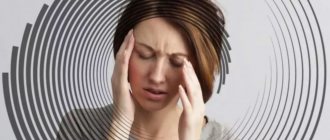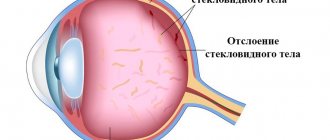Why does dizziness occur?
Dizziness that occurs when standing up has a scientific formulation - it is vertigo. There can be many reasons for such a pathology; at the moment there are more than 8 dozen of them. It is quite difficult to make an accurate diagnosis, especially if you rely on only one symptom.
Dizziness can occur in healthy people, and it can also be a sign of a serious pathology, for example, a phenomenon such as orthostatic hypotension, that is, collapse. In this case, the patient feels severe discomfort when there is a sudden change in body position or when the body remains in one position for a long time, for example, when getting out of bed, he feels dizzy.
In almost all cases of dizziness, the patient experiences darkening of the eyes. If he does not promptly take a position that will ensure blood flow to the head, he will faint.
There are other, no less important and dangerous causes of dizziness. An unpleasant phenomenon during the process of changing position may occur on the following grounds:
- Violation of the work and functioning of the vestibular apparatus;
- Staying the body for a long time in a lying or sitting position;
- Sudden changes in blood pressure;
- Constant stress, neurosis and depression.
The more pronounced the symptoms, the greater the reason for going to the doctor. Dizziness is often a symptom of low blood pressure. As soon as the position of the body changes, blood flows out of the head, that is, oxygen starvation occurs.
This symptom can be attributed to patients who have certain problems with blood vessels and the heart. The problem occurs no less often in adolescents who are going through puberty. A symptom of this type is typical when the body is dehydrated, with significant blood loss and with long-term bed rest.
Dizziness is quite often a simple reaction of the body to taking certain medications. These could be medications designed to lower blood pressure or antidepressants. The cause of dizziness when standing up may be a certain disease, for example, diabetes, atherosclerosis, anemia and other pathologies.
Is it dangerous?
If dizziness in the morning when getting up is noted after following a strict diet, after squatting for a long time, this is evidence of a simple lack of glucose in the blood. If dizziness occurs after a nervous conversation with your superiors, this indicates a sharp release of adrenaline into the blood and subsequent vasospasm.
If an unpleasant phenomenon occurs after suffering from otitis media and is accompanied by vomiting, nausea and cold sweating, you should immediately consult a specialist. You should do the same in a situation where dizziness is accompanied by nausea, fear of light and severe headaches.
If there is a problem such as lack of coordination, it is strictly forbidden to postpone going to the doctor. Neglect of this rule can lead to serious consequences.
Important! The reason to contact a professional is the presence of a variety of additional symptoms. This is a direct reason to be wary.
Treatment of dizziness
If you feel very and constantly dizzy when you stand up, you should immediately begin the treatment process. The treatment process rarely concerns the dizziness itself. Very often it is necessary to eliminate the cause of the pathology that caused it.
The most accurate diagnosis can be confirmed by a neurologist. He prescribes measures such as CT, ECG, MRI and plain x-ray. Based on the data obtained, the following treatment methods are used:
- All forms of massage, with which you can effectively influence a particular problem area that causes dizziness. Acupuncture or oriental acupuncture is no less often used.
- Reflexology is ideal for helping to cope with the problem.
- Dizziness can be dealt with through special physical therapy.
- If you use aromatherapy, you can quickly relieve severe tension from the blood vessels, thereby eliminating dizziness.
To quickly get rid of dizziness, you must give up junk food, cigarettes, alcohol, coffee and strong tea. A healthy lifestyle can significantly improve your overall condition.
If symptoms of dizziness occur infrequently, changing your lifestyle may be enough. If ailments of this kind are very frequent, one can judge such a common pathology as orthostatic collapse.
In this situation, at first you feel very dizzy, then there is a darkening in the eyes and it almost always ends in fainting. In this case, you need to contact a professional who will promptly diagnose the pathology and prescribe effective treatment.
In less dangerous cases, dizziness can be eliminated with a more active lifestyle. This applies to cases where a person leads a passive, sedentary lifestyle or has a sedentary job. To get rid of severe dizziness, you should start moving more, do special gymnastics throughout the day, and also constantly train the vestibular system.
How to eliminate dizziness when standing up?
Directly depending on the cause that caused the dizziness, the patient may be prescribed a variety of treatment methods. As an effective supplement, you can perform certain measures aimed at reducing the factor of impaired vascular tone. The main procedures of such a plan include the following:
- Before getting out of bed, you should turn on your side and bend over a little. It is advisable to stretch your legs and arms as much as possible.
- Then you need to turn to the other side, pull your limbs towards you and then straighten up completely.
- Slowly, your legs lower to the floor and your back straightens.
- After performing several exhalations and inhalations, you can get out of bed.
It is equally important to take care of yourself throughout the day. You should not sit in one position for a long time while working at a PC or watching TV. From time to time you need to get up and move a little, walking around the room.
It is necessary to ensure that the daily diet includes the required amount of useful microelements and vitamins. Don’t overwork yourself and try to study and perform breathing exercises or yoga.
Only if you carefully follow all the recommendations can you completely forget about such a nuisance as dizziness.
Main neurological causes
In the medical science of neurology, a large layer is devoted to the problem of the vestibular apparatus, since dizziness is most often due to damage to the nervous structures. Let's look at the main causes of dizziness, which are most often diagnosed in women:
Inflammation of the vestibular apparatus
Usually occurs as a complication of a viral infection. It mainly affects women aged 30-35 years. They suddenly develop severe dizziness, which is accompanied by sweating, palpitations, and general weakness. In such cases, an urgent consultation with an ENT doctor, a neurologist and the prescription of anti-inflammatory drugs are necessary.
Toxic effect of aminoglycoside antibiotics on the inner ear
Problems with visual perception may also occur during treatment with gentamicin, tobramycin, or kanamycin. Along with it, tinnitus and hearing loss may appear.
If symptoms of the toxic effects of antibiotics appear, you must stop taking the drugs and immediately consult your doctor, because such changes are irreversible.
Tumor or metastases in the cerebellum, vestibular nerve, brain stem
Unpleasant sensations in the head may be accompanied by a bursting headache, nausea, episodes of loss of consciousness, and impaired coordination of movements. If a tumor is suspected, the doctor performs an MRI or CT scan of the skull and refers the woman to an oncologist. If cancer has been detected, further tactics depend on the nature of the tumor and its location. Treatment uses chemotherapy, radiation therapy, and surgery.
Temporal lobe epilepsy
This is a special type of disruption of the cerebral cortex, in which the processes of excitation and inhibition change. With some periodicity, the temporal lobe cortex becomes overexcited and produces attacks of dizziness. It is accompanied by abdominal pain, drooling, sweating, and slow heart rate.
The main symptom of epilepsy is the seizure-like course of the disease. During a calm period, a woman feels completely healthy, but under the influence of some events or out of the blue she begins to feel dizzy. This pathology requires contacting a neurologist, who records brain activity on an EEG and prescribes appropriate treatment.
Migraine
One of the most mysterious types of headaches. It is called the “disease of geniuses”, since the relationship between a person’s outstanding mental abilities and painful attacks of the disease has long been noticed. With a migraine, the head may hurt in the forehead and eyes.
The woman needs consultation with a neurologist and treatment with anti-migraine drugs. To alleviate the condition of migraine patients, diets, physical exercises have been developed, massage and other relaxing procedures are recommended.
Encephalitis
This is an inflammation of the brain that affects the balance centers and the cerebellum. It is usually infectious in nature, but can also be toxic. If the cause is an infection, then the woman has pain and dizziness, severe weakness develops, body temperature rises to 38-40 degrees C, convulsions, blurred vision, and loss of consciousness are possible.
Encephalitis requires emergency hospitalization in a neurological or infectious diseases hospital.
Stroke
There is a sudden cessation of blood supply to an area of the brain. If the affected area is small and affects the centers of balance, then the woman’s only symptom will be dizziness. It is permanent, does not depend on the position of the body and head, the patient cannot move normally and maintain balance. Additional hearing loss or hearing loss may occur.
The patient requires emergency hospitalization in a neurological hospital. Therapy started within the first 2 hours after a stroke stops the death of nerve cells. The changes are partially reversible - a few months after the attack, the woman’s condition improves significantly.
Doctor's advice
There is a dietary supplement that works - Huato Boluses. Or the nootropic Divaza. This is something that has been tested on patients many times. It is taken either this or that (Divaza is cheaper) in a course (Divaza up to three months without a break, Huato Boluses are taken for 10 days, then a break is taken for one day and again for 10 days and so on up to three times) to prevent headaches, and not as an analgesic , i.e. in a moment of pain. Be healthy!
Victoria Druzhikina Neurologist, Therapist
Multiple sclerosis
This is an autoimmune disease in which the patient's antibodies attack her own nerve fibers and destroy them. The disease begins at a young age, is asymptomatic for some time, and then individual signs of trouble appear.
One of them may be constant dizziness, resistant to treatment and gradually progressing. A neurologist treats such patients; he prescribes drugs that suppress the activity of the immune system.
Lack of carbohydrates in the diet
Neurons require a huge amount of glucose to function, so women or athletes who are losing weight during the drying period may experience constant dizziness. In this case, it is necessary to increase the dose of carbohydrates until the condition normalizes.
Severe atherosclerosis of the vessels supplying the brain
This is one of the leading reasons why women over 50 feel dizzy. As a rule, menopause occurs during this period, and the level of the sex hormone estrogen in the blood decreases. It stops protecting the vascular wall from damage and lipid deposition, so after some time atherosclerotic plaques form in it.
The plaque bulges into the lumen of the vessel and significantly narrows it. Blood flows with difficulty, and the supply to the brain deteriorates, which is manifested by constant dizziness, tinnitus, headaches and blurred vision.
If such problems occur, you should consult a therapist who will prescribe medications to reduce the concentration of lipids in the blood and improve blood flow. Without treatment, atherosclerosis often results in a stroke.
Anemia
Anemia is a lack of hemoglobin in the blood and a decrease in its oxygen capacity. Oxygen is another essential component for the functioning of nerve cells; they absorb it intensively and in large quantities.
Even a slight decrease in oxygen concentration in the blood leads to drowsiness, increased fatigue and dizziness.
An anemic woman has pale skin and perverted taste preferences: she wants to eat raw meat, a piece of chalk or earth, she likes the smell of gasoline, lime, paint. Representatives of the fairer sex lose blood every month during menstruation and, if they do not receive enough iron from food in the form of meat, buckwheat, apples, anemia develops.
The listed symptoms are a reason to consult a general practitioner for examination and treatment.
VSD
VSD - vegetative-vascular dystonia develops for various reasons, including due to constant stress, physical. stress, mental suffering, etc. In addition to vertigo, patients often feel cold, as the circulatory system suffers, they get tired quickly and have problems sleeping.
Osteochondrosis
Osteochondrosis is a pathology that develops in people who spend a lot of time in a “sitting” position, due to which the neck is under constant tension and the vertebral vein is compressed between the cervical vertebrae. As a result, cerebral circulation is disrupted and less oxygen enters the brain, the lack of which leads to various disorders, including loss of stability and disorientation in space.
Multiple sclerosis
Multiple sclerosis is a disease characterized by the occurrence of attacks of varying duration, during which the patient experiences dizziness, unsteadiness of gait, instability, numbness of the limbs, difficulty urinating, etc.
PMS
PMS - heavy periods and lack of iron very often provoke dizziness in women. If you often encounter this problem, then visiting a gynecologist is simply necessary. The specialist will prescribe hormonal contraceptives or iron-containing vitamins to normalize well-being during PMS.
Severe stress
Severe stress - hard work, constant nervous and physical fatigue, family quarrels, mental trauma, etc. lead to a loss of vitality and general malaise of the body. The help of a psychologist will help you cope.
Pathology of the vestibular apparatus
Pathology of the vestibular apparatus is most common in women with underweight and develops at a young age (from 25 years). Patients are constantly sick in any type of transport; even ordinary rides on attractions end in a severe attack of vertigo.
Hypotension
Chronic hypotensive patients with low blood pressure begin to feel dizzy, especially with sudden movements, getting out of bed, or active physical work. The patient additionally experiences headaches, spots appear in the eyes, and vision deteriorates at the time of the attack.
Dizziness in pregnant women
Pregnancy is a completely new qualitative state of a woman, which is accompanied by significant changes in the body. The concentration of progesterone in the blood increases sharply: this sex hormone is necessary for bearing a fetus. It affects not only the uterus, but also the entire woman’s body.
Progesterone reduces pressure in arterial vessels, which reduces blood flow to the brain. In the early stages, he does not have time to adapt to new working conditions and sometimes reacts with headaches and dizziness.
A pregnant woman may feel dizzy for another reason, which also leads to partial starvation of the brain. The blood supply to the fetus requires a large volume of blood, so the amount of fluid in the mother’s vascular bed increases. In the early stages, it significantly dilutes hemoglobin, and the oxygen capacity of the blood decreases. The brain has to work in conditions of oxygen starvation, to which it immediately reacts. Subsequently, a healthy woman’s iron reserves are used, the release of red blood cells increases, and brain nutrition is improved.
Summing up
Severe morning dizziness can occur due to basic oxygen deprivation of the brain. It occurs due to a sharp drain of blood from the main areas of the brain. Also the basis is various changes in the general well-being of a person or more serious illnesses.
For this reason, consultation with a specialist and treatment are so important. Features of qualified treatment depend on the causes of the condition. It may only take one competent procedure performed by an experienced doctor.
Regardless of what causes dizziness, there is no need to fear serious complications and consequences. The problem completely goes away after completing a course of a gymnastic complex aimed at improving the functioning of the vestibular apparatus.
[morkovin_vg video=»9IxpnoXeDfw, Causes of dizziness and treatment;bWua7Rqmpf0, Dizziness;ta5WmehEEA8;gtteMAZIOf4"]
If the condition and pathology are advanced, professional treatment will be required under the mandatory supervision of a doctor. Don’t panic, but immediately visit a professional who will prescribe competent and appropriately effective treatment.
Possible diseases
In the absence of pathologies, they speak of benign paroxysmal or positional vertigo. It lasts up to 1 minute. In most patients, its episodes are not isolated and appear again with a sharp transition from a lying position to any other.
Pathological causes of dizziness include:
- Meniere's disease;
- vestibular neuronitis;
- Lermoyer's syndrome;
- central positional nystagmus;
- labyrinthitis;
- transient ischemic attack;
- stroke;
- vertebrobasilar insufficiency;
- vestibular migraine;
- perilymphatic fistula.
Only a specialist can make a correct diagnosis after a comprehensive examination. In some cases, no pathologies or abnormalities are detected, but the person experiences dizziness. Then they talk about the psychogenic nature of the condition and recommend reducing the level of stress in life.








